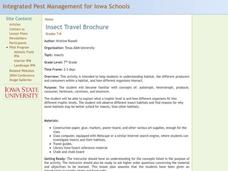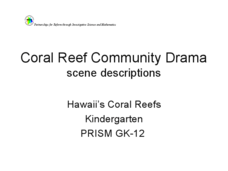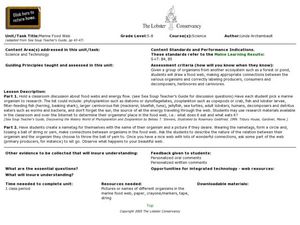Curated OER
Producers and Consumers
Students make lists of producers and consumers and act as consumers that eat producers in a garden. For this producers and consumers lesson plan, students demonstrate a food chain by using a piece of yarn to connect all of them together.
Captain Planet Foundation
Energy Flow in the Garden
How can you tell what an owl has eaten? Study the food chain and flow of energy in an ecosystem by dissecting an owl pellet and noting the bones found inside. Additionally, the lesson includes a game about consumers and producers with a...
Curated OER
Forest Food Chains and Webs
Students explore forest ecological systems. In this ecology lesson, students classify forest plants and animals according to their ecological roles. Students play a related vocabulary guessing game. Students choose a card on which a...
Curated OER
Food Chains
Fourth graders study food chains, producers, consumers, and decomposers. They play a food chain game and create food chain mobiles or posters. They take a nature hike around the school and observe various parts of a food chain.
Curated OER
Who Is Eating Whom?
Students discuss the food chain and identify if various organisms are producers or consumers. They draw ten types of organisms and construct a food web of these organisms, labelling each as a producer or consumer.
Curated OER
Constructing A Food Web
Pupils identify and explain the relationships within a food web. They use index cards to glue pictures of producers and consumers. On the back of the card, students name the organism, list the type of biome in which it is found.
Curated OER
Insect Travel Brochure
Seventh graders study producers and consumers in habitats. They examine the trophic levels and how different organisms interact with a focus on insects. They create a travel brochure for an insect to visit a habitat which they create.
Curated OER
Oh, What a Tangled Web We Weave
Fifth graders investigate the food chain by viewing video clips. In this food web lesson, 5th graders investigate populations and ecosystems by viewing a video in class as well as visiting web sites. Students utilize the Internet to...
Curated OER
My Colorful Food Chain
Students explore biology by participating in a dietary habit activity. In this food chain lesson, students discuss their own diets and the animals we feed upon daily. Students create a poster demonstrating the animals that we feed upon...
Desert Museum
Daisy Ecology
Here's a fine lesson that combines poetry with life sciences. Learners carefully listen to a poem that's all about a food chain. As the poem is read, learners name the producer, the herbivore, the carnivore, and the omnivore. Lots of...
Curated OER
Energy Flow and the Food Chain
Students complete discussions and worksheets about the Hawaiian food chain. In this food chain lesson plan, students research decomposers, consumers, and producers.
Curated OER
Marshland Ecosystems
Students identify animals in ecosystem depicted on 16th Century ceramic basin and classify them as herbivores, carnivores, or omnivores based on physical characteristics and prior knowledge, determine which life forms in ecosystem are...
Curated OER
Fun With Food Chains
Students explore our ecosystem by researching animal eating habits. In this food chain lesson, students identify the links between predator and prey and the energy that passes between organisms based on what their diet consists of....
Curated OER
Insect Travel Brochure
Students explore the concept of insects and their habitats. For this insect habitat lesson, students create travel brochures for particular insects. Students must include habitat, producers, and consumers with in the vacation spot.
Alliance Theater
The Jungle Book Post-Show STEAM Lesson
An ecosystem is really just the flow of energy through many different living organisms. A study of Rudyard Kipling's The Jungle Book leads to an environmental science activity in which learners study how various factors can affect...
Curated OER
Coral Reef Community Drama: Scene Description
Students are organized into groups and are assigned puppets according to what sea creature their group represents. In this reef lesson, students identify sea creatures according to their place in the food chain then discuss how these...
Curated OER
Discovering Local Food Chains
Fourth graders study about food chains. With the assistance of a local biologist, Students hike the school trail system. They explore ecosystem and collect data by charting the organisms found and identifying the energy source. They...
Curated OER
Energy Flow in Ecosystems
Students, in groups, create a slide show about the ecosystem and answer critical thinking questions based on their research.
Curated OER
My Biotic Creation
Eighth graders explore different ecosystems. In this ecosystem survival lesson conditions lesson students create their own fictional creature.
Curated OER
Go With the Energy Flow
Students explore energy and nutrient flow. In this science lesson plan, students diagram the flow of energy through food chains and food webs. Students discuss the importance of energy flow in Earth's ecosystems.
Aiken County Public Schools
Claymation in the Classroom
Learners design an appropriate and usable storyboard and then create a claymation video. They take digital photographs frame by frame, then assemble the stop-motion movie using video software.
Curated OER
Marine Food Web
Students investigate the effects of the food chain on all animals by creating a food web. In this seafood lesson plan, students discuss energy flow and research a specific marine organism of their choice. Students create a food web in...
Curated OER
Food Web Mobile
Students explain the main concepts of food webs and food chains. They
describe the role of animals, plants, and other organisms in cycling energy and matter through a food web by creating mobiles. Lesson contains adaptations for all levels.
Curated OER
Rainforest Food Chain
Students investigate a rainforest food chain. In this ecology instructional activity, students are shown pictures of plants and list what animals might eat the plants. Students continue to think of what other animals might eat those...

























